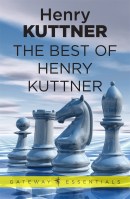
The Best of Henry Kuttner
Price and format
- Price
- £2.99
- Format
- ebook
These seventeen classic stories create their own unique galaxy of vain, protective, and murderous robots; devilish angels; and warm and angry aliens. In “Mimsy Were the Borogoves”-the inspiration for New Line Cinema’s major motion picture The Last Mimzy-a boy finds a discarded box containing a treasure trove of curious objects. When he and his sister begin to play with these trinkets-including a crystal cube that magnifies the unimaginable and a strange doll with removable organs that don’t quite correspond to those of the human body-their parents grow concerned. And they should be. For the items are changing the way the children think and perceive the world around them-for better or worse.
Ray Bradbury called Henry Kuttner “a man who shaped science fiction and fantasy in its most important years.” Marion Zimmer Bradley and Roger Zelazny said he was a major inspiration. Kuttner was a writer’s writer whose visionary works anticipated our own computer-controlled, machine-made world. At the time of his death at forty-two in 1958, he had created as many as 170 stories under more than a dozen pseudonyms-sometimes writing entire issues of science fiction magazines-in close collaboration with his wife, C. L. Moore.
This definitive collection will be a revelation to those who wish to discover or rediscover Henry Kuttner, a true master of the universe.
Ray Bradbury called Henry Kuttner “a man who shaped science fiction and fantasy in its most important years.” Marion Zimmer Bradley and Roger Zelazny said he was a major inspiration. Kuttner was a writer’s writer whose visionary works anticipated our own computer-controlled, machine-made world. At the time of his death at forty-two in 1958, he had created as many as 170 stories under more than a dozen pseudonyms-sometimes writing entire issues of science fiction magazines-in close collaboration with his wife, C. L. Moore.
This definitive collection will be a revelation to those who wish to discover or rediscover Henry Kuttner, a true master of the universe.




